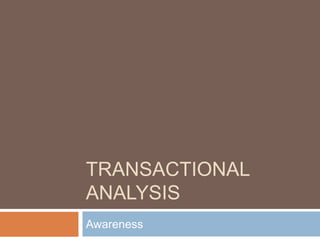
Transactional analysis
- 2. TA? Developed by Eric Berne psychotherapy in the 1950s. Eric Berne (May 10, 1910 – July 15, 1970)
- 3. What is TA? A theory for analyzing human behavior and communication.
- 4. Which means? Objective is to provide better understanding (Awareness) of how people relate to one another so that they may develop improved communication and human relationship.
- 5. Key Concept – EGO STATES Ego states refers to the three major parts of an individual personality and they each reflect an entire system of thought, feeling and behavior.
- 6. Key Concept These determine how individuals express themselves interact with each other and form relationship.
- 7. EGO STATES People interact with each other in terms of THREE psychological positions or behavioural pattern, known as ego states.
- 8. The 3 Ego States Person’s way of thinking, feeling and behaving at any time. Parent Ego State Adult Ego State Child Ego State
- 9. Parent Ego State Incorporates the attitude and behaviours of all emotionally significant people who serve as parent figure.
- 10. Parent Ego State There can be two types of parent ego states : Nurturing Parent Ego State Critical Parent Ego State Nurturing Parent ego state includes the nurturing side and can be soft, loving, and permission giving. The Critical Parent includes part of our personality contains the prejudged thoughts, feelings and beliefs that we learned from our parents.
- 11. Adult Ego State The Adult ego state evokes behaviour that could be described simply as logical, reasonable, rationale and unemotional.
- 12. Adult Ego State Characterized by problem-solving analysis and rationale decision-making. Identified by verbal and physical signs which include thoughtful concentration and discussion.
- 13. Child Ego State The child ego state is associated with behaviours that appear when a person is responding emotionally.
- 14. Child Ego State Characteristics of child ego include creativity, conformity, depression, anxiety, dependence, fear and hate. A person's child contains the 'natural' impulses and attitudes learned from child experiences.
- 15. Child Ego State There are three parts of child ego: Natural Adaptive Rebellious
- 16. Natural – Adaptive – Rebellious The natural child is affectionate, impulsive, sensuous and does what come naturally. The adaptive child is the trained one and he is likely to do what parents insist on, and sometimes learns to feel non ok. The rebellion child experiences anger, fear and frustration.
- 17. Life Positions In the process of growing up, people make basic assumptions about themselves and others.
- 18. Relationship Four possible relationship resulted from this life position. I am not OK, You are not OK (neither person have value) I am not OK, You are OK (you have value but I do not have) I am OK, You are not OK (I have value but you don't have) I am OK, You are OK (we both have value)
- 19. I AM NOT OK, YOU'RE NOT OK People tend to feel bad about themselves and see that the whole world as miserable. Give up, do not trust other people and have no confidence in themselves.
- 20. I AM NOT OK, YOU'RE OK People with this life position often come from their child ego state. They feel that others are more capable and generally have fewer problems than they themselves do.
- 21. I AM OK, YOU'RE NOT OK This type of people often come their Critical Parent ego state. They tend to be down on other people for at least two reasons.
- 22. I AM OK, YOU'RE OK This life position is considered as healthy position. People with these feelings express confidence in themselves as well as trust and confidence in other people in their environment.
- 23. Strokes The units of interpersonal recognition, to survive and thrive. Non verbal means of communication Whenever a human being does something to recognize another human being, it is called a stroke. Can be positive or negative - Can be conditional or unconditional
- 24. Strokes Conditional strokes given for what we do or what we accomplish or the trait what we possess. Unconditional stroke are negative strokes. They convey that we are not ok.
- 25. Thank you